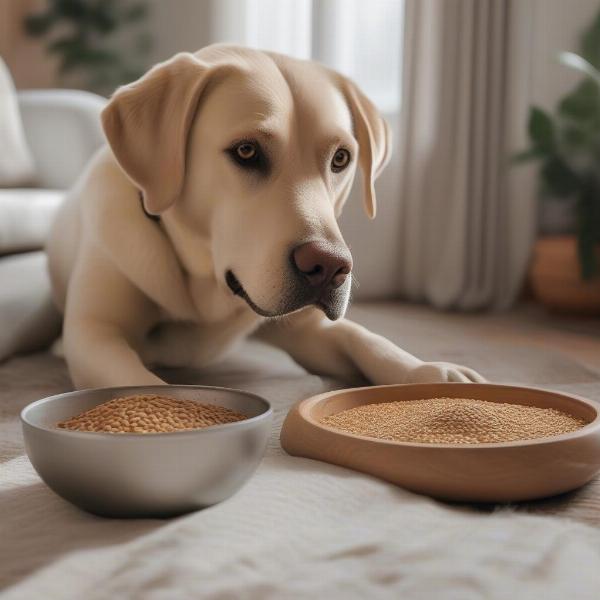Lifestage grain free dog food is becoming increasingly popular among pet owners seeking specialized nutrition for their canine companions. But is it the right choice for your dog? This comprehensive guide will delve into the world of lifestage grain free dog food, exploring its benefits, potential drawbacks, and how to choose the best option for your furry friend at every stage of their life. From playful puppies to senior sweethearts, we’ll cover everything you need to know about nourishing your dog with a grain-free diet.
Understanding Lifestage Nutritional Needs
Just like humans, dogs have different nutritional requirements at each life stage. Puppies require higher calorie and protein levels to support rapid growth and development. Adult dogs need a balanced diet to maintain healthy weight and energy levels. Senior dogs often benefit from lower calorie, higher fiber diets to manage weight and support joint health. Choosing a grain-free formula tailored to your dog’s specific lifestage can help ensure they receive the optimal nutrients they need to thrive.
Puppyhood: Fueling Growth and Development
Grain-free puppy food focuses on providing highly digestible protein sources for muscle development and essential fatty acids for healthy skin and coat. Look for formulas rich in DHA for brain development and calcium for strong bones.
Adulthood: Maintaining Optimal Health
Adult dogs require a balanced diet to maintain their ideal weight, energy levels, and overall well-being. lifestage grain free dog food formulated for adult dogs typically offers moderate protein and fat levels with added vitamins and minerals to support immune function and organ health.
Senior Years: Supporting Graceful Aging
As dogs enter their senior years, their metabolism slows down, and their nutritional needs shift. Grain-free senior dog food often features lower calorie content to prevent weight gain and added joint support supplements like glucosamine and chondroitin.
Benefits of Grain-Free Dog Food
Many dog owners choose grain-free diets due to perceived benefits like improved digestion, healthier skin and coat, and increased energy levels. Some dogs may also have sensitivities to grains, making a grain-free diet a necessity.
 Senior dog enjoying grain-free food
Senior dog enjoying grain-free food
Improved Digestion
Dogs with grain sensitivities can experience digestive upset, including diarrhea and vomiting. Grain-free formulas eliminate these potential irritants, promoting better digestion and nutrient absorption.
Healthier Skin and Coat
Grain-free diets often contain higher levels of omega-3 and omega-6 fatty acids, which contribute to healthy skin and a shiny coat.
Increased Energy Levels
Some pet owners report increased energy levels in their dogs after switching to a grain-free diet. This could be due to improved nutrient absorption and the absence of grains, which can sometimes cause lethargy in sensitive dogs.
Choosing the Right Grain-Free Food
With so many grain-free options on the market, it can be overwhelming to choose the right one for your dog. Consider your dog’s breed, size, age, activity level, and any specific health concerns.
Reading the Label
Always carefully read the ingredient list and guaranteed analysis. Look for high-quality protein sources, healthy fats, and avoid artificial colors, flavors, and preservatives.
Consulting Your Veterinarian
If your dog has any health concerns, consult with your veterinarian before switching to a grain-free diet. They can help you determine the best nutritional plan for your dog’s individual needs. grain and potato free dog food may be an option if your dog is sensitive to both grains and potatoes.
Conclusion
Choosing the right lifestage grain free dog food can significantly impact your dog’s health and well-being. By understanding their unique nutritional needs at each life stage, reading labels carefully, and consulting with your veterinarian, you can make informed decisions to ensure your furry friend receives the optimal nutrition they deserve. A well-balanced, grain-free diet can help your dog thrive throughout their life, from puppyhood to their golden years.
FAQ
- Is grain-free dog food suitable for all dogs? While many dogs thrive on grain-free diets, it’s not a one-size-fits-all solution. Consult your veterinarian to determine if it’s right for your dog.
- What are some common ingredients in grain-free dog food? Common ingredients include meat meals, poultry, fish, legumes, vegetables, fruits, and healthy fats.
- Are there any potential risks associated with grain-free diets? In some cases, grain-free diets have been linked to dilated cardiomyopathy (DCM) in dogs. More research is needed to understand this potential link.
- How do I transition my dog to a grain-free diet? Gradually introduce the new food over several days, mixing it with their current food to avoid digestive upset.
- Is grain-free dog food more expensive than traditional dog food? Grain-free formulas can be slightly more expensive due to the higher quality ingredients.
- How can I tell if my dog is benefiting from a grain-free diet? Look for improvements in digestion, skin and coat health, and energy levels.
- Where can I buy lifestage grain-free dog food? It’s available at most pet stores and online retailers.
ILM Dog is a leading online resource dedicated to providing expert advice on dog care and nutrition. We offer a wealth of information on various topics, from breed selection and health care to training and behavior. Whether you’re a seasoned dog owner or just starting your journey, ILM Dog is here to support you every step of the way. Contact us at [email protected] or +44 20-3965-8624 for personalized advice and guidance on choosing the best products and services for your beloved canine companion.